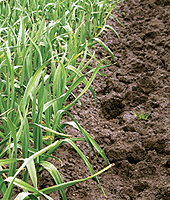Advertisement
The Dirt on Fertilizers
Walt Whitman said, “I bequeath myself to the dirt, to grow from the grass I love.” Clearly that was before the invasion of chemical fertilizers. A common additive to lawns and gardens, chemical fertilizers are designed to rid the earth of weeds and to promote the growth of beautiful flowers and grass. That seems misguided. … Continued

Walt Whitman said, “I bequeath myself to the dirt, to grow from the grass I love.” Clearly that was before the invasion of chemical fertilizers.
A common additive to lawns and gardens, chemical fertilizers are designed to rid the earth of weeds and to promote the growth of beautiful flowers and grass. That seems misguided. Sure, weeds, pests, and plants that are riddled with disease are signs of unhealthy soil, but does it help to toss chemicals into the mix?
Addictive Chemicals
There are, of course, environmental and health concerns associated with chemical fertilizers. Chemicals leach into our groundwater and contaminate our streams, rivers, and estuaries. They hurt the birds and other wildlife that linger on chemically treated grounds because they can’t read the “stay off the grass” signs.
Ironically, chemical fertilizers increase soil acidity and contribute to an exodus of earthworms and micro-organisms, robbing the soil of the very helpers needed for aeration and decomposition. This deficiency deteriorates the soil structure and leads to an increased need for fertilizers. It creates a chemical dependency.
The Alternative
While chemical fertilizers feed the plant’s growth, organic fertilizers nourish its soil. Like us, healthy plants need plenty of sunshine, a regular intake of water, grooming, a good diet of organic foods, nutritional supplements, and a chemical-free lifestyle.
Natural fertilizers, made from the byproducts of organisms, provide healthy plants with organic matter, allowing the soil to retain its moisture and nutrients. The fertilizers release their nutrients slowly, relying on the soil’s organisms to break them down, thus encouraging and sustaining the soil’s biological life. Natural fertilizing products may be more expensive than chemical brands, but because the nutrients are released slowly, natural fertilizers unlike chemical products do not require frequent reapplication.
What’s Inside?
When buying natural fertilizers, look for ingredients such as compost teas, seaweed, cottonseed meal (a favourite of acid-loving plants such as azaleas and rhododendrons), and fish meal. Good soil conditioners include well-aged manure from horses, cattle, or sheep. Avoid sewage sludge; this is recycled sewage waste that may contain heavy metals and other toxins not suitable for your soil’s consumption.
Remember, though, that fertilizing is a form of soil supplementation and should not be excessive. Conduct a soil test first to determine your soil’s deficiencies. Then buy a fertilizer whose ratio of nitrogen, phosphorous, and potassium is tailored to your soil’s needs. Before applying the fertilizer, spread a thin layer of compost over your garden, aerate, then water in the fertilizer.
Because natural fertilizers release their nutrients slowly, they are less likely to pollute our rivers and streams. But it’s still a possibility. You can reduce runoff by not watering before a rainfall and sweeping back onto your lawn or garden any fertilizing dust that landed on your driveway or sidewalk.
With natural products enriching your soil, earthworms and ladybugs can return to work, wildlife can nibble, and poets can safely compose or decompose.




